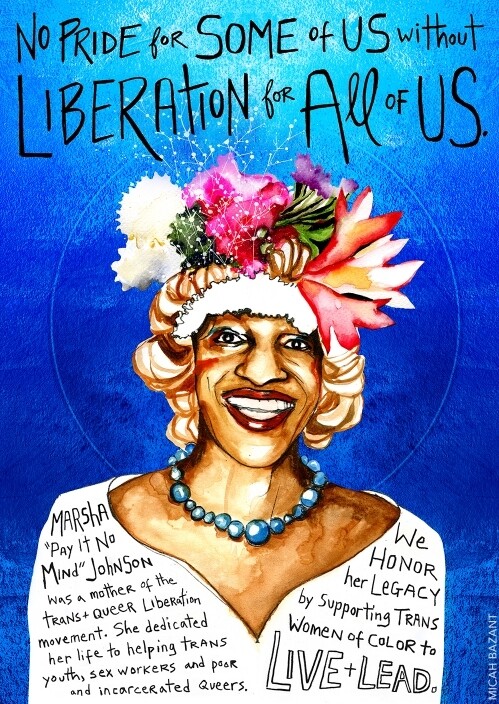Happy Juneteenth!

Outright will be closed this Monday in recognition of the Juneteenth holiday.
Juneteenth is a celebration of Black culture and community – but it is also much more. Although the date commemorates the emancipation of enslaved people in Texas in 1862, the reality is that not only did slavery extend in practice well beyond that date (which already came a full two years after the emancipation proclamation was signed), but that violence against Black people persisted and continues to persist into the present.
The fight for Black liberation continues. This Juneteenth, and this Pride month, we acknowledge that this struggle for liberation is everyone’s responsibility.
As Marsha P. Johnson says, “No pride for some of us without liberation for all of us.”
Zoraya Hightower, Executive Director of the Peace & Justice Center in Burlington, shared five strategies the center uses in their course Talking with Kids about Racism in the context of the holiday. We love the joy, wholeheartedness, and care reflected in these pointers, and Zoraya has kindly given us permission to share. We hope they spark many great conversations. Happy Juneteenth!
- Silence is the wrong message. Most White parents and teachers don’t talk with kids about race. Silence maintains the status quo and it’s the wrong message. We have a lot of conflict about what’s worse: silence or not wanting to say the wrong thing, and that’s where practice is important. Whether it’s in front of the mirror or with a fellow parent or a fellow teacher or a fellow administrator.
- Let them choose what they learn about. Folx often ask how to make conversations about race age-appropriate. We know kids internalize racial messages at a very young age – from feeling more comfortable around adults who are the same race as their caretakers at just a few months, to internalizing negative racial stereotypes by the time they start school. The best way to make conversations age-appropriate is to ask open ended questions to clarify what they already know. And if they show bias or discrimination, question it without judgement.
- Do your homework. Juneteenth is undoubtedly a celebration of black liberation and black joy. However, the more conflicted history of Juneteenth is that laws aren’t enough to create or protect human rights. Two years after the law said that all slaves were free, that wasn’t the reality. Even after Juneteenth, former slaves were not equal in the eyes of the law, the eyes of the government, or the eyes of their neighbors. We carry this legacy into the present, from police violence and voter disenfranchisement to redlined communities and discrimination. Human rights are not a straight line.
- Validate their emotions and create a safe space. Tough conversations and experiences bring up strong emotions like anger, sadness, confusion. Kids who have seen or experienced racism may have even stronger feelings or fears. Validate their emotions. We can’t fully process information until we process the emotions around that information. It helps to share your own feelings in a healthy way and point out that neither you nor they will always feel that way!
- Find the positive or the hopeful. There’s amazing stories of black joy and success and resilience and Juneteenth is a great time to share them! I hope you and the kids in your life join the many events in Burlington or in your community on Juneteenth to find those moments of celebrating black liberation!
I hope everyone has an amazing Juneteenth!”
P.s. There are lots of celebrations for Juneteenth happening all over the state! Check out the Winooski Juneteenth Celebration, the Essex Juneteenth Celebration, or events at The Old Stone House Museum, The Rokeby Museum, and The Clemmons Family Farm (register here).

